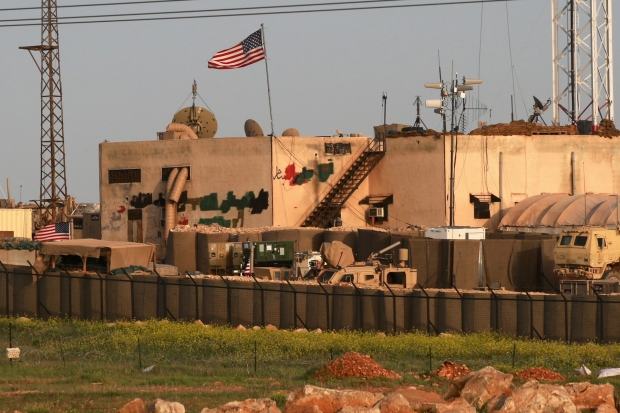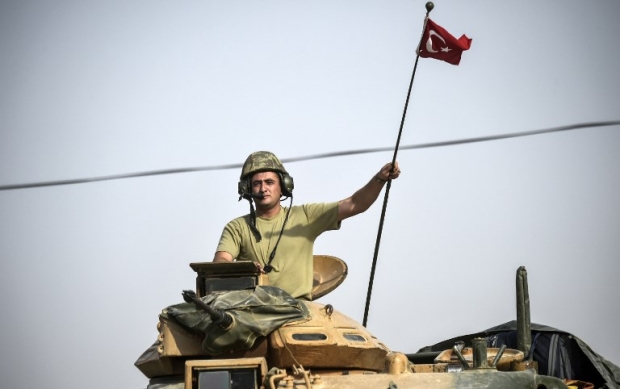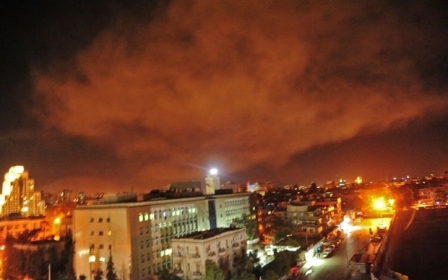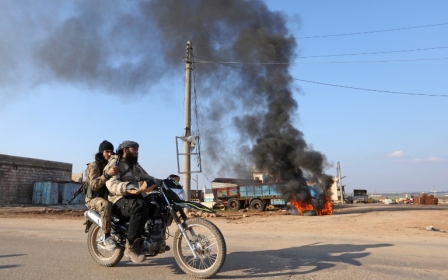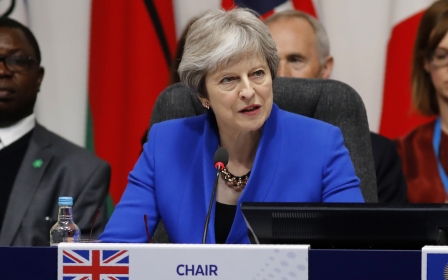'Mission creep': What is US doing in Syria?
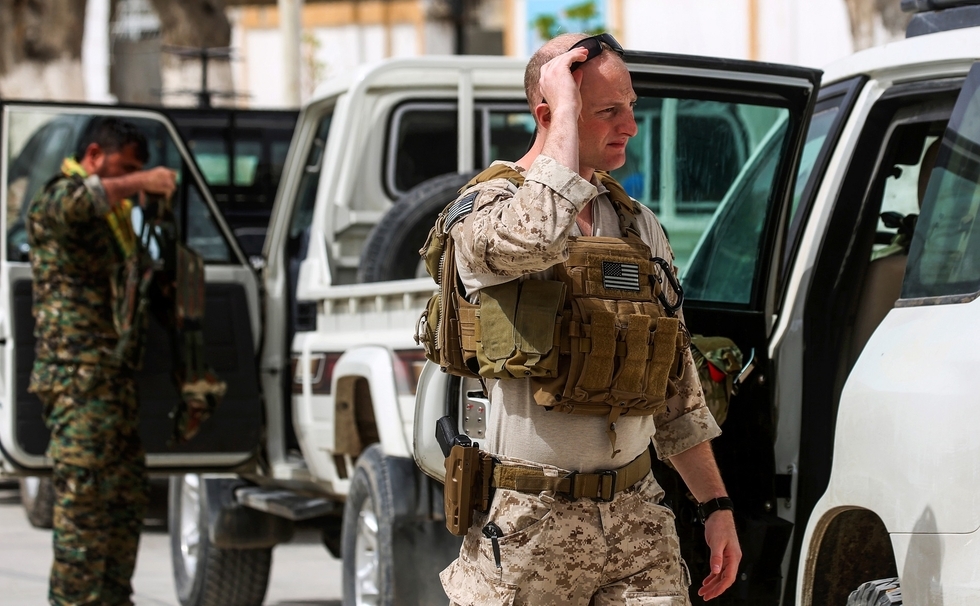
Washington is facing an internal struggle over its military involvement in the Syrian civil war - an intricate battlefield for regional proxies where the enemy of your enemy is seldom your friend.
President Donald Trump wants to get out of Syria. He and his spokespeople have made expressing this desire a daily feature of the news. Others within the administration, however, are less eager to pull American troops out of the conflict.
Washington's foreign allies, particularly France and Israel, are also lobbying for a long-term US military commitment in Syria.
"The American position in northern Syria is strategically foolish and operationally dangerous," Washington's former ambassador to Syria Robert Ford told Middle East Eye.
The Pentagon insists that its mission is focused on defeating the Islamic State (IS) group, but the militants' "caliphate" crumbled months ago.
About 2,000 US troops are stationed in northeast Syria in territories under the control of the Kurdish-dominated Syrian Democratic Forces (SDF).
Administration officials have acknowledged that the military mission is more complicated and ambitious than just dealing with IS.
The American position in northern Syria is strategically foolish and operationally dangerous.
-Robert Ford, US ambassador to Syria from 2010 to 2014
In an interview with Fox News on 14 April, US ambassador to the UN Nikki Haley outlined two goals for US presence in Syria besides defeating IS: preventing the use of chemical weapons and monitoring and quelling Iranian influence in the country.
On the day after the US-led strikes on Syrian government military facilities earlier this month, French President Emmanuel Macron proclaimed that he had convinced Trump of the need to keep troops in Syria.
Still, the White House keeps reiterating the pledge to withdraw US forces from the war-torn country without specifying a timeline, although the urgency in Trump's earlier call to bring the troops "home" seems to be fizzling.
To stay or to leave
Asked about the plan to leave Syria, the Pentagon responded ambiguously.
"The president has repeatedly stated he does not intend to telegraph US plans and intentions, and the administration's policies will not be driven by arbitrary timelines," Department of Defense spokesman Eric Pahon told MEE in an email.
"We will, however, continue to evaluate our posture with respect to conditions on the ground."
Military officials appear to contradict the White House's position on Syria, particularly in challenging Trump's assertion that the fight against IS is complete.
"We are in Syria to fight ISIS. That is our mission and our mission isn't over and we are going to complete that mission," Brett McGurk, the special US envoy for the global coalition against IS, said earlier this month.
"When territory liberated from ISIS control is not properly secured and stabilized, we have seen ISIS recover and quickly retake lost ground," he said.
Marcus Montgomery, a fellow at the Arab Center Washington DC, said even if the US president formally orders the troops out of Syria, top generals would try to prolong the withdrawal as long as possible.
"Military officials, even if they're told to do this, they would take their time," Montgomery told MEE.
'Mission creep'
Ford said Trump wants the mission to stick to its original objective - to destroy IS and depart.
He added that strong voices in "the Washington foreign policy establishment" want the mission to expand to preventing the Syrian government and Iran from consolidating gains in eastern Syria.
The broader objectives also include stabilisation efforts in areas "liberated" from IS. That includes reconstruction, humanitarian aid and setting up local security forces, according to Ford.
Trump dealt a blow to those efforts early in April when he froze $200m in recovery funds for Syria.
"The president is not very interested in this … so how they're going to pay for this is not clear," said Ford, who is currently a fellow at Yale Jackson Institute for Global Affairs and the Middle East Institute.
The former ambassador explained that some foreign policy hawks think the troops would give Washington leverage to pressure Syrian President Bashar al-Assad to make concessions in a future political settlement.
"This strikes me as sort of ... sloppy analytically," Ford said.
He added that Washington is facing a risk of "mission creep" in Syria, where the objectives are gradually expanding to make the US a long-term party in the conflict.
"The president is right about one big thing, which is that the American people don't want to get more involved in the Syrian civil war," Ford said. "Of that I am completely convinced."
Turkish concerns
Turkey has been sounding the alarm about Washington's alliance with Kurdish fighters in Syria; it views the People's Protection Units (YPG), the dominant force in the SDF, as an extension of Turkey's Kurdistan Workers' Party (PKK).
The PKK, which is designated as a terrorist group by Washington and most Western capitals, has been waging a military campaign in Turkey for decades. Ankara is anxious that a Kurdish canton along the border with Syria may fuel militant attacks and calls for Kurdish autonomy in Turkey.
Turkish officials, including President Recep Tayyip Erdogan, have warned that the US is merely replacing one "terrorist group" with another by driving out IS and empowering the YPG.
Despite Washington's backing for the Kurds, Turkey's army and its Syrian rebel partners have captured the northern province of Afrin from the SDF. Ankara has also threatened to advance on the SDF-held town of Manbij, where US troops are stationed.
Montgomery, of the Arab Center, said the Trump administration has not addressed the Turkish issue.
"That doesn't really register as something of huge concern for the administration right now. They're still focused on ISIS and Iran," he said.
Montgomery added that Trump and his aides do not seem to understand the gravity of Turkey's concerns.
Ford echoed Montgomery's comments, saying that the administration had done "nothing" to ease the worries of the Turks.
He added that US policies towards the Kurds may push Turkey to cooperate with Iran and Syria to undermine Washington's efforts in Syria.
An Arab alliance
While the Syrian government and its allies have not made US military deployment in the country a priority, officials have referred to the American troops as an occupying force.
The Wall Street Journal last week revealed US efforts to work with Arab allies to replace American military personnel in northeast Syria.
It's a strange idea for an illegitimate occupying power to send invitations to other parties to come and occupy the country as well.
-Bouthaina Shaaban, Assad aide
Trump alluded to the plan when he announced the strike on Syrian military facilities on 13 April.
"Increased engagement from our friends including Saudi Arabia, the United Arab Emirates, Qatar, Egypt and others can ensure that Iran cannot profit from the eradication of ISIS," Trump said.
Saudi Arabia has offered to send a military force to Syria to back the Americans or even replace them, an idea that has been rejected by Damascus.
Assad aide Bouthaina Shaaban has ridiculed the proposal of deploying Arab troops to Syria.
"It's a strange idea for an illegitimate occupying power to send invitations to other parties to come and occupy the country as well," Shaaban told Russia's RT network.
However, despite Riyadh's professed eagerness to answer Washington's call in Syria, rallying Arab troops to head to the war-torn country is a tough task that may take years to accomplish.
Rivalries with Doha over the Gulf crisis aside, Egypt is fighting its own war against IS in the Sinai province. Meanwhile, the Saudis and Emiratis with their local allies are struggling to advance against Houthi rebels in Yemen as the three-year-old war has come to a standstill.
Montgomery said sending Arab troops to Syria is not a realistic proposal.
"I don't think what the Trump administration is envisioning is something that those countries are willing to do right now," he said, adding that regional armies are already stretched, fighting their own wars.
"And then you still have the Gulf crisis," Montgomery said.
Middle East Eye propose une couverture et une analyse indépendantes et incomparables du Moyen-Orient, de l’Afrique du Nord et d’autres régions du monde. Pour en savoir plus sur la reprise de ce contenu et les frais qui s’appliquent, veuillez remplir ce formulaire [en anglais]. Pour en savoir plus sur MEE, cliquez ici [en anglais].


